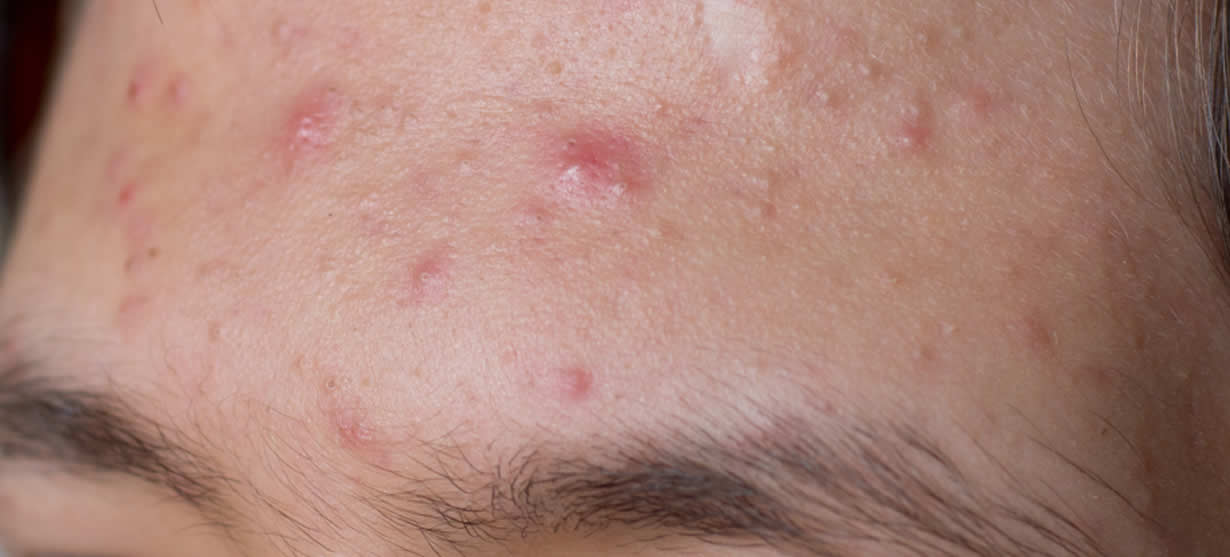Acne

What is acne?
Acne is a very common skin condition characterised by comedones (blackheads and whiteheads) and pus-filled spots (pustules). It usually starts at puberty and varies in severity from a few spots on the face, neck, back and chest, to a more significant problem that may cause scarring and have a significant impact on self-confidence. For the majority it tends to resolve by the late teenage years but it can persist for longer in some people. It can develop for the first time in people in their late twenties or even the thirties.
Unfortunately, many doctors can trivialise the effects acne can have on a person’s confidence, self-esteem & quality of life. Dr Hussain is passionate about treating acne early and effectively as he fully understands the consequences of living with spots. He will listen to your concerns and devise a management plan to get your skin looking great!
What causes acne?
The oil-producing (sebaceous) glands are particularly sensitive to normal blood levels of certain hormones, present in both males & females. In acne, these glands produce an excess of oil. At the same time, the dead skin cells lining the pores clog up the follicles. As a result, there is a build-up of oil, producing blackheads & whiteheads.
The ‘acne bacteria’ (Propionibacterium acnes) lives on everyone’s skin & in those prone to acne, the build-up of oil creates an ideal environment in which the bacteria can multiply. This triggers inflammation and the formation of red or pus-filled spots.
Some acne can be caused by medication given for other conditions or by certain contraceptive injections or pills. Some tablets taken by body-builders contain hormones that trigger acne and other problems. Acne can very rarely be caused by problems with hormones.
How is acne diagnosed?
Acne is recognised by the appearance of the spots and by their distribution on the face, neck, chest or back. However, there are several varieties of acne and Dr Hussain will be able to tell you which type you have after examining your skin.
Can acne be cured?
Dr Hussain has extensive experience in dealing with patients with acne. He will discuss with you the available treatments which can be very effective in preventing the formation of new spots and scarring.
How can acne be treated?
Acne treatments fall into the following categories:
- Cream treatments
- Tablet antibiotics
- The oral contraceptive pill
- Isotretinoin tablets
Cream treatments
These should be applied to the entire affected area of the skin (e.g. all of the face) and not just to individual spots, usually every night or twice daily. There are a variety of active anti-acne agents, such as benzoyl peroxide, antibiotics (e.g. erythromycin, tetracycline and clindamycin), retinoids (e.g. tretinoin, isotretinoin and adapalene), azelaic acid and nicotinamide. Dr Hussain will discuss which option he feels is best for you.
Oral antibiotic treatment
Dr Hussain may recommend a course of antibiotic tablets (usually tetracyclines), often in combination with a cream treatment.
Antibiotics need to be taken for at least three months so it is important that you stay motivated and complete the course for the length that Dr Hussain has prescribed for you.
Oral contraceptive treatments
Some types of oral contraceptive pills help women with acne. These tablets do however increase the risk of blood clots & this is a greater risk for people who smoke, are overweight or have others in the family who have had blood clots. Dr Hussain will often recommend that you go and discuss your risk with your GP.
Isotretinoin
This is a highly effective treatment for acne which continues to benefit most patients for up to two years after a course of treatment. However, it has the potential to cause a number of serious side effects and can be prescribed only under the supervision of a consultant dermatologist. Dr Hussain has many years of experience in successfully treating acne with this medication.
Isotretinoin can harm an unborn child. The government medicine safety agency (MHRA) therefore has strict rules for doctors when prescribing Isotretinoin. Dr Hussain will advise all female patients to enrol in a pregnancy prevention programme. They will need to have a negative urine pregnancy test prior to starting treatment. These tests will be repeated every month during treatment and five weeks after completing the course of treatment. If sexually active, effective contraception must be used for at least four weeks before treatment, whilst on treatment and for at least four weeks afterwards.
There are concerns that isotretinoin may cause depression and suicidal feelings. Acne itself often makes people feel depressed so this can be complicated. Details about any personal and family history of depression or other mental illness should be discussed with Dr Hussain.
Dr Hussain will prescribe the medication (according to the dose taken) between four to twelve months. During this time the skin usually becomes dry, particularly around the lips. Regular application of a greasy lip moisturiser like Vaseline is usually helpful. It is not uncommon for acne to become a little worse for a few weeks before improvement occurs.
Many thousands of people have benefited from treatment with isotretinoin without serious side effects.
If you have any questions or comments, or if you want to learn more about the services of Dr Walayat Hussain, please call 0113 388 2234 or submit an online form by clicking here.

